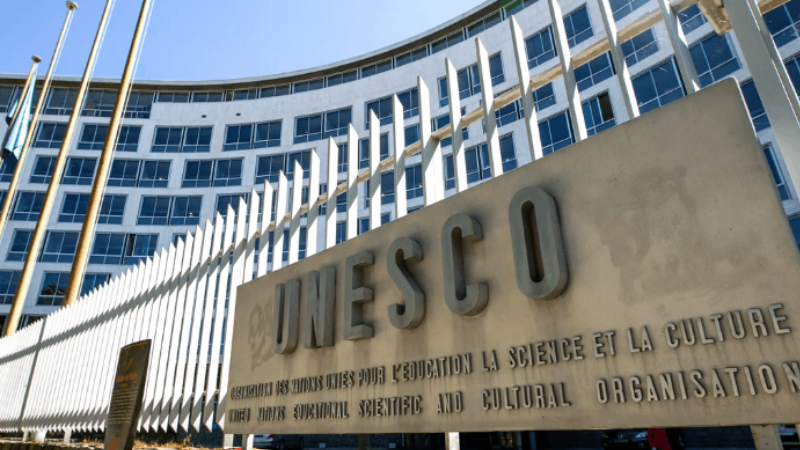
When Ayeni Oluwatobi Dorcas, widely known as Misstechy, stepped onto the stage at UNESCO-UNEVOC’s World Youth Skills Day 10th anniversary forum in Paris, she did not merely represent herself. She carried with her the audacious hopes of millions of young Africans navigating the promises and perils of artificial intelligence in their daily lives, creativity, and livelihoods.
The forum, themed “Youth Empowerment through AI and Digital Skills,” gathered global education leaders, policymakers, and innovators to examine how AI is transforming technical and vocational education and training (TVET). Yet, beyond the institutional commitments and data presentations, it was Misstechy’s grounded, candid voice that illuminated the conversation with urgency and vision.
On her first panel, “AI in TVET – A Tool for Empowerment or a Threat to Human Potential?” Misstechy addressed the delicate tension between AI’s potential to democratise opportunity and its capacity to erode authenticity. She drew attention to the fast-blurring line between real and AI-generated content on social media, raising a crucial caution for a continent where digital literacy gaps remain wide. For Africa, AI-generated misinformation is not simply an online nuisance it carries profound real-world consequences, influencing perceptions, politics, and livelihoods.
Her message, however, was not dystopian. It was anchored in possibility. “AI might help bring ideas to life, but it can never replace the human soul behind true creativity. The vision and spark will always come from us,” she said. It was a powerful reminder that technology remains an enabler, never a replacement for human ingenuity.
Her second panel, “Policy and Practice—Skills Demand, Trends, and Institutional Readiness,” placed her alongside prominent figures such as UNESCO’s Borhene Chakroun and Germany’s Heike Kuhn. Unlike many panellists who spoke from an institutional lens, Misstechy spoke from the heart of Africa’s digital grassroots. She shared real stories of young Nigerians learning and creating in resource-constrained environments, where resilience and improvisation remain central to growth.
She recounted her own journey in experimenting with AI-generated videos. Frustration and confusion marked her early attempts, almost leading her to abandon the process entirely. But learning by doing, coupled with the motivation of online communities, transformed her path, revealing the vital role of accessible peer networks in overcoming digital barriers.
A particularly profound insight was her commentary on how Gen Z learns. She challenged traditional education models that still rely on long, dense lectures, noting that they alienate a generation raised on focused, bite-sized content streams. For her, platforms like TikTok are not just for entertainment but have emerged as classrooms without walls. If learning is to remain relevant and impactful, it must be accessible, relatable, and immediately applicable to young people’s lives.
Her observations resonated with the forum’s data showing that only a fraction of TVET institutions globally are ready to deploy advanced AI tools, while a youth-led survey revealed thousands of young people worldwide already using AI for practical problem-solving. This gap is not about curiosity; it is about structured, accessible, and inclusive training.
Beyond digital upskilling, Misstechy emphasised a strategic truth that remains underexplored in global AI conversations: Africa’s true competitive advantage in the digital age lies not in mimicking Silicon Valley’s technical models but in amplifying its intrinsic human capital, creativity, emotional intelligence, cultural storytelling, and innovation born from scarcity.
She challenged the prevailing narrative of Africa as a passive consumer of imported AI solutions. Instead, she positioned the continent’s youth as creators, innovators, and problem-solvers capable of defining global digital trends with uniquely African perspectives.
Central to her vision is the understanding that digital empowerment requires more than technical knowledge. Confidence to experiment, communities that nurture growth, and courage to fail forward are the intangible but critical ingredients missing in many policy blueprints. Infrastructure, funding, and curricula remain essential, but psychological empowerment, the belief that one’s ideas are valid and can create value, is equally non-negotiable.
Her journey, built on self-taught experimentation and community support, offers a blueprint for Africa’s policymakers, educators, and development partners. As innovation hubs and digital training programmes expand, equal investment must be made in building safe spaces where young people can test, iterate, and refine ideas without fear of failure.
Reflecting on the conversations in Paris, it becomes clear that digital literacy for Africa’s youth must move beyond mere tool usage. It must embed critical thinking and ethical interrogation to ensure responsible and empowering AI adoption. Learning must transition from rigid curricula to practical, mobile-first, bite-sized content that mirrors the learning patterns of today’s youth. Policies must integrate community-building and psychological empowerment alongside physical infrastructure.
Misstechy’s presence in Paris was more than symbolic. It was a strong affirmation that Africa’s digital future will not be defined by technology alone but by the creativity, courage, and community of its young people who choose to deploy these tools to transform their realities.
As she eloquently summed it up, “AI has no soul. We do. And that is Africa’s greatest digital advantage.”
Original article from Business Day


